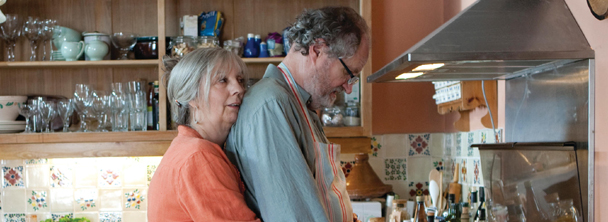Another Year
An unconventionally told tale of conventional middle-class angst, Another Year is quite special.
Plot summary
A happily married, middle-aged couple is visited by a number of friends who use them as confidants.

The film opens with an uncomfortably tight close-up of Imelda Staunton’s scowling face. The ruddy, thin lipped grimace, panicky aversion to eye contact, deep-set frown lines all paint a picture of hounded unhappiness. It’s an unnerving start. Just a few minutes in the doctor’s room with Janet – a sleep starved, middle-aged, depressive – and already a hefty dose of our sympathy has unwittingly been tapped. And Leigh begins as he means to go on. The experience of watching this film feels a bit like giving blood, so exhausting and draining are the lines of pathos that he channels from us. This is not to misrepresent the film, as it is, by turns, one of sharpest, wittiest British films for quite some time.
In four perfectly captured seasons, Leigh tells the story of Tom and Gerri (Broadbent and Sheen), a couple in the autumn of their lives who are unimaginably happy. Still very much in love and clearly the closest of friends, they are a compelling advert for successful marriage. At weekends we’ll find them at the allotment gathering the season’s fair, sharing a cup of tea in a rain pelted shed, looking, as ever, unperturbedly content. Tom is a successful geologist who loves his work, and Gerri a therapist. We are introduced to the latter with the reluctant return of poor old Janet for a doctor-prescribed therapy session. All she wants is a fist full of sleeping pills, not Gerri’s wholesome, motherly advice. We never see Janet again after this, but her unresolved melancholy skulks in the rafters for the rest of the film. Sheen and Broadbent exist as mother and father figures to all, and are superb in these roles. They are the warming, remedial glue that hold the, at times, unbearably bleak sub-matter of the film together.
Although the film rests on this cosy paragon of domestic bliss, we soon become distracted by the gaggle of anti-bodies that rapidly flood the scene. If Staunton’s gnarled insomniac, Janet, was a sketch of utter despair and unhappiness, Gerri’s colleague and scatty friend Mary, (Lesley Manville, a Leigh regular) is a far more textured and complicated study of middle-aged discontent. Speaking at times with the tactless verbal propulsion of an ecstasy fuelled mong, Mary is a jittery, giggly cyclone of wine, fags and slack sexual etiquette. As the seasons unravel, so does Mary’s sanity. Her desperation to be ‘happy’, her incessant self-reflexive commentary is achingly tragic. She is dying to be loved. No one gives it to her and it is truly heartbreaking to witness.
Add to the equation Ken, Tom’s gruff northern childhood friend: an obese, chain smoking, Tenant–guzzling, cheese and onion mess who visits his friends in their London idyll for a cathartic outpour and and a piss-up. In one memorable scene at the dinner table, the camera stares fixedly in morbid curiosity as Ken crams his wobbly chops with salmon and potato, barely chewing between glugs of red wine and slugs of bitter, finishing with a long, toxic draw on a Mayfair Superking, all the while secreting beads of alcoholic sweat. Like Mary, he is alone, deeply unhappy, and uses booze and nicotine as medicine. He lusts for Mary, who views him as a despicable lardy failure, but doesn’t see the kindred spirit in him. All of these darkened soles are the satellites that orbit the reassuring safety and stability of Tom and Gerri’s happy equilibrium.
Not a lot actually happens in the film, we just dip in and out of these characters’ lives, witnessing the hilariously tragic interactions shared between the unhappies and the happies. It is exquisitely shot, with the colouring appropriately graded to the hue of the passing seasons. A death in the family heralds winter, and the photography turns an ashen grey. An unconventionally told tale of conventional middle-class angst, Another Year is quite special. In essence, this is a film about being okay – or rather, about being decidedly not okay and the pressure to be okay. The expectation to be feeling a certain way, at a certain time, and the galling realisation that perhaps life isn’t turning out right. It’s a feeling that everybody at some point feels, that sickening, hot stress of comparing one’s self to one’s peers and friends and thinking, I’m not keeping up.










COMMENTS